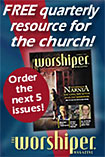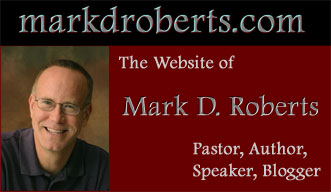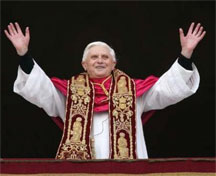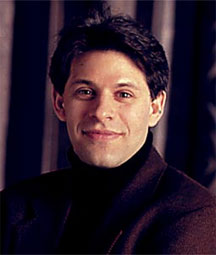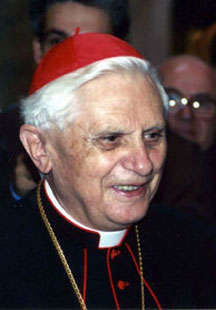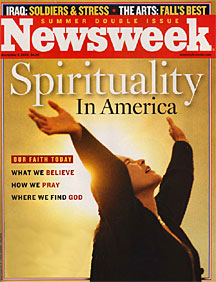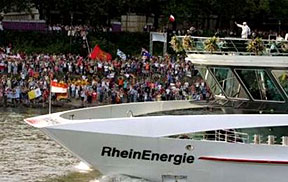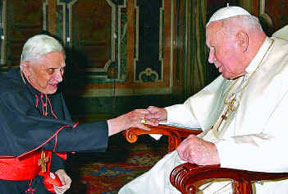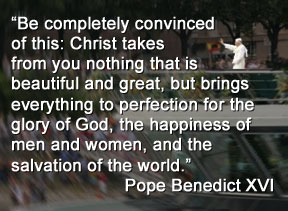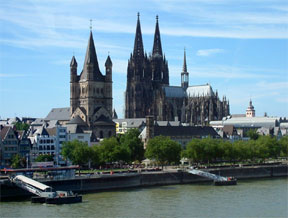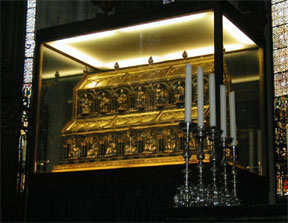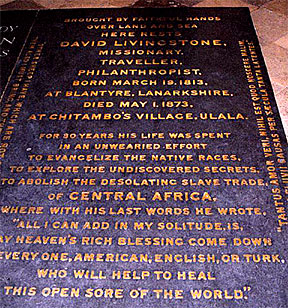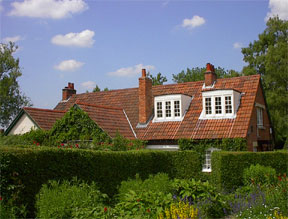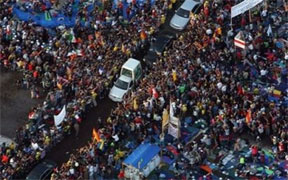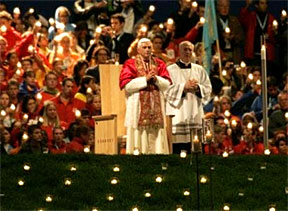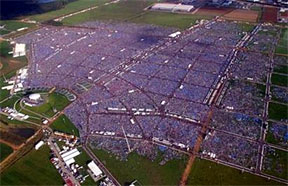| |
A Resource by Mark D. Roberts |
|
Pope Watch:
Reflections on the Papacy of Benedict XVI
by Rev. Dr. Mark D. Roberts
Copyright © 2005 by Mark D. Roberts
Note: You may download this resource at no cost, for personal use or for use in a Christian ministry, as long as you are not publishing it for sale. All I ask is that you give credit where credit is due. For all other uses, please contact me at mark@markdroberts.com . Thank you.
The Cardinal Sin of the New Pope
Posted for Wednesday, April 20, 2005
| Given the momentous election of Cardinal Ratzinger as the new Pope, I thought I'd take a short break in my "Blogging and Sainthood" series. I expect to get back to it tomorrow. (By the way, a fascinating discussion of Cardinal Ratzinger's ideas about the church can be found in an article by Richard John Neuhaus.) |
I'll confess that I was disappointed by the election of Cardinal Joseph Ratzinger as Pope Benedict XVI. Not that my opinion matters all that much, mind you. As a confirmed Protestant, who I wanted for Pope counts about as much as who I wanted for President of Iraq. Nevertheless, I had hoped that the conclave of cardinals in Rome might have chosen as Pope someone from the Southern Hemisphere. As a symbolic move, this would have been monumental, both for Roman Catholicism and for the whole church of Jesus Christ. But it's quite clear that the Catholic church isn't ready for such a bold move into the future.
When Karol Wojtyla became Pope John Paul II, he was virtually unknown outside of the Roman Catholic hierarchy (except in Poland, of course). The situation with Joseph Ratzinger aka Benedict XVI is quite different. As the Prefect for the Congregation for the Doctrine of the Faith, Cardinal Ratzinger had a very public record of enforcing Catholic theological standards, a task that included removing several prominent liberal theologians from official positions as Roman Catholic teachers. (For the list of those removed in recent years, click here.)
| Throughout the last few days, as the talking heads buzzed about Ratzinger's potential papacy, and during several news reports today, I was struck by the way many people in the media describe Ratzinger's efforts to reign in "loose-canon" Catholic theologians. They tend to use words like "narrow," "extreme," "ultra-conservative," and "divisive" to characterize Ratzinger's behavior. His cardinal sin – from a postmodern cultural perspective – is expecting Roman Catholic teachers to teach Roman Catholic doctrine, at least when it comes to major beliefs and hot-button issues. It's almost as if secular commentators envision the Roman Catholic Church as a modern university where the tenured professors can say anything they want without accountability. This seems to be both naïve and sadly out of touch with Roman Catholic reality. |
|
| |
Pope Benedict XVI. No this is not a picture of him singing "Shout to the Lord." Rather, he's blessing the crowds in the Vatican. |
I am not an expert in Catholic theology. Nor have I read extensively the writings of the theologians whom the Vatican disciplined under Cardinal Ratzinger's guidance. But when I was in graduate school, I did read some of the works of some of those theologians, including writings by Leonardo Boff, Matthew Fox, and John McNeill. I can remember wondering as I read their works how these folks got away with it, since their views seemed to contradict orthodox Christian theology, not to mention Roman Catholic theology. Matthew Fox's "creation spirituality," for example, seemed to me more New Age than Christian, and his flirtations with paganism seemed to go way over the line of acceptable Christian creativity.
As I understand it, Cardinal Ratzinger didn't censor these theologians or burn their books. He didn't try to take away their freedom to express their views. And, as far as I know, he didn't have them excommunicated (rather like being kicked out of the Catholic church, but not exactly; for clarification see William's post in my guestbook). He simply took away their right to express their non-Catholic views as recognized Roman Catholic teachers. Yet this, in the opinion of many critics, is an extraordinary secular sin. From my point of view, it's both defensible and, in fact, commonsensical.
I say this as someone who, were I a Roman Catholic, would be quickly dismissed from an official church teaching position. My views on many things (ecclesiology, papacy, sacraments, grace) are way too Protestant for a Roman Catholic teacher. But, given what I believe and teach, I would hope that I wouldn't expect to receive authorization from the Catholic church to advocate clearly non-Catholic doctrines.
I operate in a denomination that allows for much greater freedom of conscience in many things than the Roman Catholic Church. But even I have promised to uphold the basics of the Christian faith as it's understood in the Reformed tradition. If I were to reject these basics, to teach, for example, that salvation can be found apart from Jesus Christ, then I could lose my right to speak as a Presbyterian pastor. Yet I don't resent this sort of accountability. In fact, I would argue that if I ever were to teach that Christ is my savior but not the Savior of the world, then I should be removed from my office as a Minister of Word and Sacrament in the Presbyterian church. Actually, I hope I would have the decency to remove myself before others had to do the dirty work for me.
Consider a few analogies. If a Vice President for Apple starts publicly touting the benefits of Windows, should she keep her job? If a professional baseball player says, "Hang the rules. I'm going to take steroids anyway," should he be allowed to keep on playing without reprisals? If a university professor plagiarizes the research of others, should there be no consequences? If a reporter for the New York Times makes up facts in news stories, should that reporter keep his job? Every company, every organization, every institution has basic values and rules of operation. If people within that organization choose to reject the values or break the rules, then they are disciplined, and sometimes that discipline includes being excluded from the organization. To be sure, this sort of procedure can be abused by people in power. Sometimes it is vengeful and unjust. But sometimes it is both fair and just. If you're going to be a part of an institution that has clear values and rules, you must expect to live within them.
So, though I'm not privy to the details of Cardinal Ratzinger's actions as Prefect for the Congregation for the Doctrine of the Faith, in which capacity he was instrumental in disciplining many theologians, I do not think he needs forgiveness for upholding basic Roman Catholic doctrine. Now if he did so unkindly, or if his theological judgments were unfair, then these are sins for which forgiveness is necessary. But expecting Roman Catholic teachers to teach Roman Catholic beliefs is not wrong. And asking authorized teachers who contradict Church doctrine to revise their views is not wrong. And, if they refuse, taking away their Roman Catholic authorization is not wrong.
Though I'm quite sure Pope Benedict XVI has plenty of sins for which he needs forgiveness – as do we all – I don't think his enforcing of Roman Catholic theological standards falls into the sin category. The fact that so many secular commentators seems to think so illustrates the extent to which they just don't "get" Roman Catholic reality, not to mention the truth-centeredness of orthodox Christianity.
Why the Pope is Like the Nazis . . .
And Other Pearls of Wisdom from the Los Angeles Times, Part 1
Posted for Sunday, April 24, 2005
| Yes, I know that I usually post lighter or more inspirational material on Sundays, but I was struck by the need to respond to a recent op-ed piece in the Los Angeles Times. This is the first of two posts. Tomorrow I'll also put up the next post in my series "God's Guidance for Christians in Conflict." |
" . . . the Catholic Church was not responsible for the Holocaust . . ."
"I do not mean to suggest that Benedict's imperial certitude . . . is the same as the Nazis', or the Communists', or even Osama bin Laden's."
-- Daniel Jonah Goldhagen
Los Angeles Times, April 22, 2005
This last Friday the Los Angeles Times brought reassuring news: The Catholic Church was not responsible for the Holocaust. And Pope Benedict XVI's conviction that salvation is found only through Christ does not make the Pope exactly the same as Nazis, Communists, or Islamic terrorists. There, aren't you relieved?
When I first read Daniel Jonah Goldhagen's opinion piece in the Times, I thought I must have misunderstood him. Yet as I examined "A German Lesson: the Fallacy of One True Path" more closely, I discovered that I had in fact gotten his point the first time around: Pope Benedict XVI's "imperial certitude" is not just the same as the greatest mass murderers of the last century, but, and here's the astounding thing, it is close enough to warrant a statement of reassurance that's it's not just the same. Goldhagen's point is that the new Pope's beliefs, though not identical to those of the Nazis et al., are, nevertheless, so similar as to warrant a clarification that they are not alike. If somebody compliments you by telling you you're not just like the Nazis, beware! You're being damned with faint praise.
| Who is Goldhagen and why does he need to assure us that the Pope is not the same as the Nazis even though he's quite a bit like them? Daniel Jonah Goldhagen received his Ph.D. from Harvard in 1992. (Ironically, he and I must have been in the same graduation ceremony, because that's when I received my Ph.D. also.) While teaching at Harvard throughout the next decade, Goldhagen made a name for himself by publishing controversial books on the Holocaust. Though he has been the darling of journalists and non-specialists, historians have, for the most part, strongly criticized his work. Nevertheless, Goldhagen has become a trusted popular spokesperson for the view that responsibility for the Holocaust lies, not only with the Nazis, but also with the whole German people and, to a great extent, with the Roman Catholic Church. From this trenchantly ideological perspective Goldhagen shares his wisdom about Pope Benedict XVI in the Los Angeles Times. |
|
| |
Daniel Jonah Goldhagen |
To his credit, Goldhagen begins by dismissing the significance of Joseph Ratzinger's brief participation in the Hitler Youth and in the German army (which he quickly deserted). But Goldhagen believes that, in more worrisome ways, Ratzinger in fact shares common convictions with the Nazis.
Ironically, it's Ratzinger's criticism of the Nazis that gets Goldhagen's goat. Behind the rise of Nazism and other evils, Ratzinger sees a relativistic rejection of the truth that is revealed in Jesus Christ. Ratzinger seems to understand that, once you can decide for yourself which truth to believe, rather than receiving God's singular revelation in Christ, you can go all sorts of different ways, toward Nazism, towards modern pluralism, or towards you name it. Thus, in Ratzinger's view, what lies behind Nazism is, philosophically speaking, similar to what lies behind contemporary pluralism. Both depend upon the relativistic rejection of Jesus Christ as the "one truth path" (Goldhagen's phrase, as far as I know).
Goldhagen doesn't like this idea, to say the least. He writes, "Benedict's conflation, under the rubric of 'relativism,' of the horrors of Nazism, a creed of extreme intolerance, with modernity and pluralism today is self-evidently bizarre." The great thing about claiming that something is self-evidently bizarre is that you don't have to defend your claim. By implication, even an idiot could see your point. But, frankly, I find Benedict's insight to be self-evidently obvious and not terribly bizarre. Reject God's revelation in Christ and you get into a mess of trouble, whether as a Nazi or as a modern relativist. The results differ by a mile, but the starting point is more or less the same.
Goldhagen goes on in his article to show that the Catholic Church, though "not responsible for the Holocaust," (whew!) nevertheless did not oppose Nazism sufficiently. This notion is not especially new. For years I've heard Christians lament the lack of resistance among believers to the Nazis, so Goldhagen's point is commonplace, though he seems to push it in new directions.
But then he makes a huge logical jump. Let me quote so you'll not worry that I'm misrepresenting Goldhagen:
A man living through this period and witnessing the destruction of Hungarian Jewry — as Benedict has conceded — and the German episcopate's support of the Nazis' war of conquest would know how fallible the church's true path has been.
Here is a classical logical mistake. If we grant that the Church was at times gravely mistaken in its response to the Nazis, this does not necessarily mean that "the church's true path" was itself "fallible." It can also mean that the Church failed to follow its one truth path. I would argue, like many others before me, that the failure of the church in Germany didn't have to do with too much holding up Jesus as the one true Lord, but with too little. In other words, the church got off the one true path, lost its singular relevance to Jesus as Lord, and that explains its tragic failure to respond adequately to Nazism.
If you'll permit me a Protestant moment, I should like to mention one Christian response to Nazism that stayed close to the one true path. It was the response of the so-called "Confessing Church," the church that saw allegiance to Hitler and the Third Reich as contrary to allegiance to Christ and the Kingdom of God. The central document of the Confessing Church was "The Theological Declaration of Barmen," written by Karl Barth and endorsed by the Confessing Church.
The Barmen Declaration unabashedly opposes Hitler and his government. This explains why many who endorsed it, like Dietrich Bonhoeffer, were killed by the German government. What, you might wonder, is the theological foundation for this Christian opposition to Nazism? The theological section of the Barmen statement beings by citing two passages from the Gospel of John: "I am the way, and the truth, and the life" (John 14:6) and "I am the door; if anyone enters by me, he will be saved" (John 10:9). In other words, the solid foundation upon which the Confessing Church stood against the Nazis is nothing other than an unabashed faith in the uniqueness of Jesus Christ, the one true path, if you will.
In my next post I'll finish this examination of the LA Times article. Plus, tomorrow I'll also continue my series, "God's Guidance for Christians in Conflict."
Why the Pope is Like the Nazis . . .
and Other Pearls of Wisdom from the Los Angeles Times, Part 2
Part 3 of the series: Pope Watch: Reflections on Benedict XVI
Posted for Monday, April 25, 2005
Yesterday I began to examine a recent op-ed piece in the Los Angeles Times. This column by Daniel Jonah Goldhagen, "A German Lesson: the Fallacy of One True Path," argues that Pope Benedict XVI's commitment to "one true path" makes him similar to the Nazis and Communists, though, as Goldhagen assures us, his "imperial certitude" is not "the same" as that of the greatest mass murderers of the last century.
According to Goldhagen, Pope Benedict XVI has failed to learn from the tragedy of the Holocaust. To prove his point, Goldhagen quotes from Ratzinger's Declaration in 2000 known as Dominus Iesus (Jesus is Lord). In this document the man who would be Pope rearticulated the classic Roman Catholic (and orthodox Christian) belief that Jesus is the one true Savior of the world. Therefore "the Church must be missionary," proclaiming the gospel of Christ to all people.
Goldhagen is scandalized by this. He writes:
Benedict has not fully learned the bitter lessons of teaching contempt for Jews and peoples of other faiths. He personally deals with Jews respectfully and congenially, has condemned anti-Semitism and has worked to further the general progress of the church regarding Jews. Yet continuing to approach Jews with the insistence that they must renounce their Jewishness and embrace this church is a reaffirmation of 2,000 years of the church's refusal to accept the legitimacy of Judaism (as well as other faiths, including Islam).
|
|
| |
The man who would be Pope |
For Goldhagen, anyone who believes that Jesus is the one true Lord and Savior necessarily holds Jews and other religious people in contempt, even if that person, like Pope Benedict XVI, treats actual Jews and others with respect and kindness, and condemns their mistreatment. Wow! If Goldhagen is correct, all orthodox Christians hold in contempt all non-Christian people, even if we treat them with respect and love. If we think that their religious beliefs are wrong, then, according to Goldhagen, this means we have contempt for them. (Of course Goldhagen doesn't consider that he is rejecting one of my core beliefs, namely the belief that Jesus is the Savior of the world. Does this mean that Goldhagen holds me in contempt? I guess so, according to his standards. I thought we merely disagreed.)
Notice carefully that Goldhagen accuses Benedict of reaffirming "2,000 years of the church's refusal to accept the legitimacy of Judaism (as well as other faiths, including Islam)." Actually, Goldhagen misunderstands the church's view of Judaism, in which the Jewish religion is "legitimate but incomplete." Be that as it may, Goldhagen appears to think that the Pope should not reaffirm a central doctrine of the church, one that by the writer's own admission has been in place for 2,000 years. Does Goldhagen actually expect the Pope to reject something that, according his own observations, orthodox Christians have believed from the very beginning? I'm tempted at this point to say that Goldhagen's criticism is "self-evidently bizarre." Would he also want the Dalai Lama to reject basic Buddhism? Should leading Islamic clerics reject central Muslim beliefs? Will Goldhagen be satisfied only when everyone accepts his version of relativistic pluralism? Hmmm. Now this sounds rather "one-true-path-ish," don’t you think?
Goldhagen continues:
Benedict's theology that the church must single-mindedly combat relativism with an imperial insistence on the world adhering to the church's one true path shows that he has not learned perhaps the most essential lesson of the 20th century. Religious and secular creeds that have fought pluralism . . . by trying to institute a uniform adherence to a single truth have produced colossal catastrophes. Whatever one thinks of "relativism," history shows that the cure of fighting modernity and pluralism with synchronizing orthodoxy is worse than the alleged disease.
As I've mentioned before, I have not read much of what Cardinal Ratzinger has written. He has been, after all, quite prolific. But I have carefully examined the one document Goldhagen actually refers to, Dominus Iesus. To characterize Ratzinger's conviction that the church should tell the world about salvation in Christ as "imperial insistence on the world adhering to one true path" is neither accurate nor fair. In fact, the new Pope seems less interested in creating a Christian empire than in seeing Christians as a faithful minority in the world. Goldhagen uses the word "imperial" to paint the Pope's theology in the worse possible light, a light that distorts Benedict's intentions. Dominus Iesus speaks about bearing witness and living out the gospel in the world. It says nothing about imposing faith upon people or the Church ruling over people In fact, Ratzinger clearly distinguishes between the kingdom of God and the Catholic church, though he sees the two as closely connected.
Goldhagen believes that "the most essential lesson of the 20th century" is that efforts "to institute a uniform adherence to a single truth have produced colossal catastrophes." I imagine he's thinking of Nazism, Communism, and, perhaps, Islamic extremism, and to this extent I would agree with him. But one could also argue that the commitment to the single truth of democratic freedom for all people actually defeated the first two catastrophes, and is hard at work in beating the third. In other words, the problem isn't with singular truth, but with picking the wrong singular truth. Of course Goldhagen believes that the world would be a better place if pluralism were to prevail as the world's singular truth. But it's easy to see how a thoroughgoing pluralist might be willing to let tyranny stand, as long as it didn't interfere with his or her own personal freedom. Haven't we already seen this sort of thing in the blasé response of some Europeans to Islamic terror?
Furthermore, Goldhagen has made an illogical jump. The fact that some "true paths" turned out to be catastrophic (Nazism and Stalinism, for example) does not imply that all "true paths" must be catastrophic. Suppose, for example, I wanted to drive to a store across town, but didn't know the way. Suppose, moreover, that I took a couple of roads that turned out to be dead ends. You'd think me silly if I were to conclude, on the basis of my limited experience, that no roads will lead to the store. You'd tell me to try again, or, better yet, to consult a map so that I could find the "one true path" to the store.
Though Goldhagen doesn't mention it, his article does point to one of the true problems with Christianity: so many who claim to be followers of Christ end up wandering far off his path and doing terrible things, sometimes even in His name. It's one of the sad ironies of history that some of those who follow the One who embodied the love of God and who told us to love even our enemies have, in the name of Christ, done oppressed or killed other human beings. Yet this doesn't mean there's something wrong with Christianity itself. Rather, the problem is with those who wrongly practice it. Goldhagen might do well to consider the observation of the Catholic Christian writer G.K. Chesterton, who noted, "The Christian ideal has not been tried and found wanting. It has been found difficult; and left untried" (in What's Wrong with the World, Part I, Chapter 5).
Goldhagen wraps up his column by assuring us that "Benedict's imperial certitude" (there's Goldhagen's favorite word again, "imperial") is not "the same as the Nazis' or the Communists' or even Osama bin Laden's." The difference, Goldhagen explains, is that the Catholic Church, which numbers over a billion people, "has no wish to physically conquer and coerce those who disagree." By implication, however, Benedict is like the Nazis and their ilk in his certainty that there is one truth path. But why limit this criticism to the Pope, who by Goldhagen's own admission is merely echoing what Christians have affirmed for 2000 years? Goldhagen's argument isn't with Benedict XVI, but with all orthodox Christians who believe that Jesus is, in fact, the Savior of the world. (As an orthodox Christian I would add that Goldhagen's argument is really with God, who sent his Son as Savior of the world.)
Ironically, Goldhagen himself seems to believe in one true path, the path of relativistic pluralism. Though this isn't quite accurate. A true relativist would let Benedict have his certitude. Instead, Goldhagen wants the Pope to endorse the writer's own one true path. He wants us to accept the one true path of believing that all "one-true-path-isms" lead to colossal catastrophes, all except Goldhagen's one true path, that is.
As Goldhagen acknowledges, for 20 centuries Christians have believed that Jesus is the one true path to God, the "way and the truth and the life" (John 14:6, quoted three times in Dominus Iesus, by the way). Thus for 20 centuries faithful Christians have shared this truth with others. We call this evangelism. Yes, at times the Christian evangelistic effort was unwisely intertwined with an imperialistic agenda. Yes, at times Christians tried to force unbelievers into faith and threatened them with punishment if they did not convert. But if you actually read Ratzinger's Dominus Iesus, you'll find none of this, not even a hint. What you'll find is a biblically-based call for Christians to share with others who Jesus is and what He has done. And you'll find a surprisingly positive estimation of the extent to which other religions can help people find God. They don't complete the job, in Ratzinger's traditional Christian view, but they can contribute substantiall to it.
I should mention that you'll also find in Dominus Iesus some bluntly critical words about non-Catholic churches. In fact, Protestant churches that do not have bishops and a Catholic understanding of communion "are not Churches in the proper sense," even though we still have "significance and importance in the mystery of salvation." Not surprisingly, I don't agree with this. Yet I'm not in the least offended by the fact that the Pope holds a consistently Roman Catholic view of the Church and is willing to say so. What else should I expect? A Protestant Pope? Now that would be self-evidently bizarre.
I find it ironic that, for the second time in two weeks, I've written an extensive defense of Pope Benedict XVI. (Here's the first one.) I've done this because he has become a lightening rod for criticism of orthodox Christianity in a world beset by the plagues of relativism, pluralism, and secularism. When a former Harvard professor can write an article arguing that the Pope's faith in Christ as the only Savior makes him like the Nazis, and when a major publication like the Los Angeles Times will print such an article, it's easy to see where the true battle lines are drawn. And, though I would disagree with Benedict XVI on many theological issues, in the battle with secularism I am passionately on his side. Perhaps it would be more accurate to say that we are both passionately on the side of Jesus Christ, who is, as Christians have believed for 2000 years, "the way and the truth and the life" (John 14:6).
What Did the Pope Actually Say to the Muslim Leaders? 
Part 4 of series: Pope Watch: Reflections on the Papacy of Benedict XVI 
Posted for Tuesday, August 23, 2005
| I'm taking a break in my Summer Vacation 2005 series to examine some of what Pope Benedict XVI said in his recent trip to Germany. Thanks to Hugh Hewitt for urging me to do this. I may (or may not) get back to my vacation series in a few days. With blogging, you never know for sure. |
Pope Benedict XVI has just completed a momentous trip to his German homeland. The chief purpose of his visit was World Youth Day, now a triennial gathering of youth that was instigated by Pope John Paul II in 1984.
With this blog post I want to begin a short series examining three of the Pope's speeches in Germany. These have been widely reported in the press, but sometimes what we read in the media doesn't exactly convey the tenor of the Pope's comments. Moreover, most stories don't actually analyze the theological positions advocated in the speeches. So I'd like to look closely at these speeches from a rhetorical and theological perspectives. I plan to focus on the speeches to: Muslim leaders, welcome to youth along the Rhine River, 800,000 youth at the Saturday vigil, and 1,000,000 young people at Sunday Mass.
| Note: This was my plan, and I got mostly through the Vigil address, when Hurricane Katrina changed my plans. I'm sure I'll get back to the Pope sometime, but I'm not sure when. It's that way with blogging, always a bit unpredictable. |
The Speech to Muslim Leaders as Portrayed in the Los Angeles Times
During his visit to Germany, the Pope met with a variety of groups, including a group of Jewish leaders in a synagogue and a group of Muslim leaders in the Cologne cathedral. During this latter meeting the pontiff delivered a short speech (1,072 words in English).
I first became aware of this speech when I read the main headline of Sunday's Los Angeles Times: "Pope Attacks Roots of Terror" [subscription required ]. The subtitle read: "In pointed remarks, the pontiff tells Muslim leaders in Germany that 'teaching is the vehicle' to promote peace or sow seeds of fanaticism." So the Pope "attacks" and offers "pointed remarks," I thought. This fits the image of the tough, abrasive Benedict that has been spread all over the media in recent months, but I wondered if it was a fair appraisal of his interaction with Muslim leaders.
The Times story went on to explain that the Pope used "unusually tough language Saturday to tell Muslim leaders they must work harder to combat terrorism and steer youths away from 'the darkness of a new barbarism.'" Yeow! Now that's really getting in the faces of the Muslim leaders. The Times contrasted the approach of Benedict XVI with his predecessor John Paul II: |
|
| |
The Pope meets with Muslim leaders in the Cologne cathedral. Not exactly a "take your shoes off and kick back" gathering. Copyright © 2005 Reuters
|
His [Benedict's] pointed remarks were made to a community with whom his relations were already strained, and marked a departure from the papacy of John Paul II, who worked to promote interfaith dialogue.
Not surprisingly, the Times reported that the response of Muslim leaders was less than enthusiastic.
Mahmut Askar, a prominent Muslim leader in Cologne, said he was not surprised at the pope's stern lecture. Muslims, he said, are routinely and unfairly blamed as a group for the terrorism committed by a handful of extremists
"We are used to this," Askar, a Turkish-born engineer who has lived in Germany for more than three decades, said in an interview. . . .
"No one would blame Christianity for terror acts committed by a Christian. But Muslims are always blamed," he said. "What else can we do to show the world that we are not born terrorists?"
The implication of these quotations, of course, was that the Pope had blamed Muslims, either explicitly or implicitly, for terrorism, while he lectured Muslim leaders on their responsibility to make things better. Meanwhile, the Times pictured the Muslim leaders as fair and balanced in speaking judiciously about the Pope and in calling for fairness and dialogue:
Seyda Can, one of three women who attended the meeting with the pope and one of two wearing a head scarf, said she believed in the pope's call for a stronger dialogue between Christians and Muslims.
"When we have this dialogue, we will have trust and we won't be afraid," Can, 27, told reporters after the meeting. "With the dialogue, terrorism will be finished."
Finally, in the last three paragraphs of the story, the Times mentioned that the Pope admitted Christians weren't without blame in the matter of religious violence. He was quoted as saying:
How many pages of history record battles, and even wars, that have been waged with both sides invoking the name of God, as if fighting and killing the enemy could be pleasing to him? . . . The recollection of these sad events should fill us with shame, for we know only too well what atrocities have been committed in the name of religion.
I must confess that, after finishing the Times article, I wasn't terribly happy with Pope Benedict's speech. Though his content was fine, his tone, as conveyed by the Times, seemed unduly harsh and supercilious. Surely the pontiff could have done a better job reaching out to Muslim leaders, even if his message were the same.
But, in fairness to the Pope, I planned to check out the text of his speech today. Here's what I found.
What the Pope Actually Said to the Muslim Leaders
I should begin by saying that I appreciate the decision of the Times' editors to put this story on the front page. Though I have some misgivings about the content of the story, I affirm their sense of the importance of Pope Benedict's activities in Germany. Too often momentous religious stories get a blurb on page 32, if at all. The Times has done well in its placement of this story.
When I read what the Pope actually said to the Muslim leaders, however, I felt as if I were reading a different speech from the one described in the Times. To be sure, many of the main themes were found in both speeches. But the actual address was far less strident and brusque than I had thought it would be. If I were trying to come up with the headline for the Times story, I would never have used the verb "attacks." (And I noticed that every other major news source used a mellower and more accurate verb, something like "urges" or "implores" or "addresses.") Here's how the Times started:
Pope Attacks Roots of Terror: In pointed remarks, the pontiff tells Muslim leaders in Germany that "teaching is the vehicle" to promote peace or sow seeds of fanaticism.
Were I the writer or editor, here's what I would have done instead:
Pope Urges Religious Cooperation in War on Terror: In no-nonsense remarks, the pontiff invites Muslim leaders in Germany to work together to "turn back the wave of cruel fanaticism that endangers the lives of so many people."
But, of course, my headline and subhead wouldn't fit the image of the harsh pontiff of barbed-speech and little tact. They do, however, fit the words of the speech Benedict actually delivered, one in which he did not blame Muslims for terrorism, but freely recognized that Christians have also invoked the name of God to defend their own "atrocities."
According to the Times, "[Benedict's] pointed remarks were made to a community with whom his relations were already strained, and marked a departure from the papacy of John Paul II, who worked to promote interfaith dialogue." Ah, yes, the "mean Benedict is not like nice John Paul" line again. But, in fact, this is what the new Pope actually said about interfaith relations in his speech: |
|
| |
|
Dear friends, I am profoundly convinced that we must not yield to the negative pressures in our midst, but must affirm the values of mutual respect, solidarity and peace.
[T]he Church wants to continue building bridges of friendship with the followers of all religions, in order to seek the true good of every person and of society as a whole.
As Christians and Muslims, we must face together the many challenges of our time. There is no room for apathy and disengagement, and even less for partiality and sectarianism. We must not yield to fear or pessimism. Rather, we must cultivate optimism and hope. Interreligious and intercultural dialogue between Christians and Muslims cannot be reduced to an optional extra. It is in fact a vital necessity, on which in large measure our future depends.
So is this really "a marked departure from the papacy of John Paul II, who worked to promote interfaith dialogue"? Or is that "marked departure" more in the mind of the Times writer than in the actions of the new Pope?
Though I haven't read too many other media reports of the Pope's speech to Muslim leaders, my guess is that the Times is not alone in reproducing the image of the harsh, scolding Benedict. Most journalists, especially those who are more steeped in news stories than in the actual communications of Pope Benedict XVI, believe that their picture of Benedict is the correct one. And the more they tell the same story in the same way, the more they will be reaffirmed in their prejudice. But the truth isn't too hard to find, if one is willing to examine what the Pope actually says and writes.
The first line of the Times story reads: "Pope Benedict XVI chose unusually tough language Saturday to tell Muslim leaders they must work harder to combat terrorism and steer youths away from 'the darkness of a new barbarism.'" In fact the Pope did not tell Muslim leaders that they must work harder, implying that they haven't been doing enough already. He said nothing of the kind. Moreover, he never stated or implied that the responsibility for combating terrorism rests primarily on Muslim shoulders. Throughout the speech the pontiff repeated the call for Christians and Muslims to work together in this endeavor. In one of the most poignant lines, he said,
If together we can succeed in eliminating from hearts any trace of rancour, in resisting every form of intolerance and in opposing every manifestation of violence, we will turn back the wave of cruel fanaticism that endangers the lives of so many people and hinders progress towards world peace. The task is difficult but not impossible. The believer knows that, despite his weakness, he can count on the spiritual power of prayer.
Notice the first two words: "If together." These words set the tone for the entire speech. In fact, I can imagine many conservative Christians worrying that Benedict was implying too much common ground between Christians and Muslims here, by suggesting that Muslim "believers" can "count on the spiritual power of prayer."
In my next post I want to examine this notion a bit more closely. According to Pope Benedict XVI, what do Muslims and Christians have in common such that we can fight terrorism together? Is he right about this?
Pope Benedict XVI on Common Ground Between Muslims and Christians 
Part 5 of series: Pope Watch: Reflections on the Papacy of Benedict XVI 
Posted for Wednesday, August 24, 2005
Although the press has, at least in some quarters, portrayed Pope Benedict XVI's address to German Muslim leaders as a condescending, demanding lecture, in fact it was a strong rhetorical effort to construct and to build upon common ground between Christians and Muslims. This was not an easy task, given the fact that there are crucial differences (pun intended) between core Christian and Muslim beliefs. Nevertheless, the Pope made a valiant effort to chart out common ground. Some might say that his effort was a bit too valiant, in fact, that he gave away too much ground in the process of looking for shared soil.
Thirteen Elements of the Common Ground
I have identified thirteen different elements in Benedict's common ground. The titles that follow are mine. The quotations are the Pope's. After I list these thirteen elements, I'll close with a couple of personal reflections.
According to the Pope's speech, Muslims and Christians share:
1. A common concern: the spread of terrorism
"I am certain that I echo your own thoughts when I bring up as one of our concerns the spread of terrorism."
2. A common mission: to turn back the wave of cruel fanatacism
"If together we can succeed in eliminating from hearts any trace of rancour, in resisting every form of intolerance and in opposing every manifestation of violence, we will turn back the wave of cruel fanaticism that endangers the lives of so many people and hinders progress towards world peace. The task is difficult but not impossible."
|
|
When It Rains, It Pours
Well, just as I begin a short series focusing on the speeches of the Pope, I receive the latest Newsweek magazine. The cover proudly proclaims: "Spirituality in America: Our Faith Today – What We Believe; How We Pray; Where We Find God." The issue includes results of a recent survey on American religious attitudes and practices. Though I've only scanned the several pieces that make up the cover story, I see lots here for comment. But this will have to wait. In the meanwhile, you might want to check out Newsweek for yourself.
|
|
3. A common conviction: the power of prayer
"The believer knows that, despite his weakness, he can count on the spiritual power of prayer."
4. A common respect for each other
"Dear friends, I am profoundly convinced that we must not yield to the negative pressures in our midst, but must affirm the values of mutual respect, solidarity and peace."
"We must seek paths of reconciliation and learn to live with respect for each other’s identity."
5. A common conviction: the sacredness of each human life
"The life of every human being is sacred, both for Christians and for Muslims."
6. A common conscience
"The dignity of the person and the defence of the rights which that dignity confers must represent the goal of every social endeavour and of every effort to bring it to fruition. This message is conveyed to us unmistakably by the quiet but clear voice of conscience."
7. A common basis for understanding: the centrality of the person
"Only through recognition of the centrality of the person can a common basis for understanding be found, one which enables us to move beyond cultural conflicts and which neutralizes the disruptive power of ideologies."
8. A common history of conflictual relationship
"Past experience teaches us that relations between Christians and Muslims have not always been marked by mutual respect and understanding. How many pages of history record battles and even wars that have been waged, with both sides invoking the name of God, as if fighting and killing the enemy could be pleasing to him."
9. A common shame over the past
"How many pages of history record battles and even wars that have been waged, with both sides invoking the name of God, as if fighting and killing the enemy could be pleasing to him. The recollection of these sad events should fill us with shame, for we know only too well what atrocities have been committed in the name of religion."
10. A common God and a common worship
"[I]t is always right to recall what the Fathers of the Second Vatican Council said about relations with Muslims. 'The Church looks upon Muslims with respect. They worship the one God living and subsistent, merciful and almighty, creator of heaven and earth, who has spoken to humanity and to whose decrees, even the hidden ones, they seek to submit themselves whole-heartedly, just as Abraham, to whom the Islamic faith readily relates itself, submitted to God . . . .'"
11. A common modality for social transformation: teaching
"Teaching is the vehicle through which ideas and convictions are transmitted. Words are highly influential in the education of the mind. You, therefore, have a great responsibility for the formation of the younger generation. As Christians and Muslims, we must face together the many challenges of our time."
12. A common task: facing our contemporary challenges
"As Christians and Muslims, we must face together the many challenges of our time. There is no room for apathy and disengagement, and even less for partiality and sectarianism. We must not yield to fear or pessimism. Rather, we must cultivate optimism and hope."
13. A common need for dialogue
"Interreligious and intercultural dialogue between Christians and Muslims cannot be reduced to an optional extra. It is in fact a vital necessity, on which in large measure our future depends."
Some Reflections
It's striking to me how much common ground the Pope was able to find with Muslims. He wasn't lecturing the Muslim leaders on what they must do nearly so much as laying out a vision for a shared mission. Far from being a strident, bossy lecture, the Pope's address was a laudable effort to deal openly with the tough but inescapable issue of terrorism, and to build bridges of understanding between Christianity and Islam.
From the point of view of Christian theology, I find it fascinating that the Pope is willing to refer to a Muslim as a "believer" who "knows . . . he can count on the spiritual power of prayer." This seems to fit with what was taught by the Second Vatican Council, in a passage quoted by the Pope: "[Muslims] worship the one God living and subsistent, merciful and almighty, creator of heaven and earth, who has spoken to humanity . . . ."
Is this true, from a Christian point of view? The question of whether Christians and Muslims worship the same God is a tricky one upon which Christians disagree. Though the Pope, following Vatican II, seems to emphasize the common worship of Christians and Muslims, Professor Doug Groothuis, in a short, well-reasoned, online article, claims that the differences between Christian and Muslim views of God and worship make it unreasonable to claim that practitioners of both religions worship the same God.
There's no doubt that Christian and Islamic views of God have much in common, mostly that which they share with Judaism as well. When Christians pray, they are addressing the God of Abraham. The same is true for Muslims. Yet they envision this God quite differently, most of all when it comes to the core question of the deity of Jesus Christ. For Christians, Jesus is both fully human and fully God. For Muslims, the oneness of God completely precludes Jesus from being anything other than a human prophet. To speak of Jesus as God or of God as Trinity is, for Muslims, to speak falsehood and to dishonor God.
So the issue of whether or not Muslims and Christians worship the same God has everything to do with what we mean by "the same God." To put it crudely, both Muslims and Christians pray in the same direction. No, not toward Mecca. I mean in the direction of the Creator and God of Abraham. Yet their conceptions of this God differ widely. No amount of interreligious dialogue will be able to erase the irreconcilable theological differences between Christians and Muslims. (That these differences are both great and irreconcilable is reflected in the seriousness with which Islam punishes the Muslim who converts to Christianity.)
At two points it's obvious that the Pope is trying to find common ground when he cannot appeal to his usual sources of authority: Bible, Christ, Church, Spirit, etc.:
Only through recognition of the centrality of the person can a common basis for understanding be found . . . .
This message [of individual human dignity] is conveyed to us unmistakably by the quiet but clear voice of conscience.
Benedict does not establish the centrality of God as a common basis for understanding, perhaps because he knows that Muslims and Christians have such different views of God. So he's left with the centrality of the person, whatever that means exactly. The authority for this isn't God, but the "clear voice of conscience." Frankly, I'm not sure that the voice of conscience is actually all that clear when it comes to individual human dignity. Sin blinds us from seeing each person as created in God's own image, and therefore as worthy of respect.
To sum up, the Pope has made a praiseworthy effort to stake out common ground between Christians and Muslims. Whether all the elements of this ground are solid is debatable. But what the Pope is modeling is essential in our time of history. We Christians need to join with Muslims in opposing terrorism. Rhetoric that accentuates the genuine differences between us will not be especially helpful in this regard. Pope Benedict, whether we agree with him about the details or not, has modeled the kind of effort that is so desperately needed in today's world.
The Welcoming Address, Section A 
Part 6 of series: Pope Watch: Reflections on the Papacy of Benedict XVI 
Posted for Thursday, August 25, 2005
Recently Pope Benedict XVI made a trip to Cologne, Germany. The chief purpose of this visit was to participate in World Youth Day, a gathering of over a million young Catholics. During this convocation, actually more of a four-day event than a single "day," the Pope gave a number of speeches. I want to examine some of these speeches in depth because they are some of the first addresses of the new Pope that are clearly intended for a worldwide audience. Surely they have set the stage for his papacy.
In my last two posts I examined the Pope's address to Muslim leaders. This address showed Benedict's willingness to take on difficult issues without equivocation and his effort to build bridges of cooperation with Islamic leaders. He clearly believes that the effort to defeat terrorism requires profound partnership between Muslims and Christians.
In my next few posts I want to take a close look at three major addresses. These were the main point of the Pope's visit, as they were intended for the youth who had gathered in Cologne for a time of worship and spiritual renewal. Yet, no doubt, Benedict also realized that these addresses would be read throughout the world. The three speeches are:
1. The Address in the Papal Welcoming Ceremony from a boat to people gathered in a large park on the bank of the Rhine River (given on Thursday evening, August 18, 2005).
2. The Address in the Vigil with youth in a former open-cast mine near Cologne, which was renamed Marienfeld for the occasion (Saturday evening, August 20, 2005).
3. The Homily in the Mass with youth at Marienfled (Sunday morning, August 21, 2005).
| Note: This was my plan, and I got mostly through the Vigil address, when Hurricane Katrina changed my plans. I'm sure I'll get back to the Pope sometime, but I'm not sure when. It's that way with blogging, always a bit unpredictable. |
The Welcoming Address
A few hours after Pope Benedict XVI arrived in Cologne, he cruised the Rhine River on a large boat. Stopping alongside a giant riverside park, he addressed the masses of young people who had gathered there (rather like Jesus on the Sea of Galilee, I might add).
| If I had heard nothing about this pope before, and had only read this address, I would never have imagined that he is often considered to be austere and overly-academic. In fact, I would envision a man with lots of personal warmth and a vibrant faith. I would think of him as a pastor who cares deeply about his flock and isn't afraid to offer clear, biblically-based pastoral advice. I'm not suggesting that I agree with everything Benedict XVI has to say. Our Catholic-Protestant differences do show up at points. But what we hold in common far outweighs these differences. |
|
| |
Here the Pope is waving at the crowd on the shore. Soon he will speak from the boat. |
The overall theme of World Youth Day 2005 was "We have come to worship him" (Matthew 2:2). This particular line appears on the lips of the Magi, sometimes called Wise Men, in Matthew's gospel. The Magi served as a thematic focus for the Pope's three main addresses to the youth.
This theme perfectly suited the ministry of Benedict in Cologne for several reasons:
1. It had been established by John Paul II, and thus tied together his papacy with that of Benedict XVI.
2. The Magi traveled a greatest distance to see Jesus, even as many of the youth in Cologne had traveled hundreds if not thousands of miles.
3. The cathedral in Cologne is the final resting place for what are believed to be the bones of the Magi. They are housed in the so-called "Shrine of the Three Kings" kept safely in the cathedral. (I'll have much more to say about this in tomorrow's post.)
For the rest of my examination, I'll cite portions of the Pope's address (Arial font) and then add my comments (serif font).
I am delighted to meet you here in Cologne on the banks of the Rhine! You have come from various parts of Germany, Europe and the rest of the world as pilgrims in the footsteps of the Magi. Following their route, you too want to find Jesus. Like them, you have begun this journey in order to contemplate, both personally and with others, the face of God revealed by the Child in the manger.
Great beginning, connecting the youth with the Magi, and pointing them to Jesus.
Like yourselves, I too have set out to join you in kneeling before the consecrated white Host in which the eyes of faith recognize the Real Presence of the Saviour of the world. Together, we will continue to meditate on the theme of this World Youth Day: "We have come to worship him" (Mt 2: 2).
It comes as no surprise that the Pope's understanding of communion is a Roman Catholic one. What else would we expect? Non-Catholics can see in this paragraph how much the Host (communion element) is taken to represent the actual presence of Christ, not it a naive physical way, but through "the eyes of faith."
Rhetorically, the Pope's claim to be joining the youth in kneeling before Christ is astute. It builds relationship with the youth and it emphasizes their common humility before Christ.
Some of you might perhaps describe your adolescence in the words with which Edith Stein, who later lived in the Carmel in Cologne, described her own: "I consciously and deliberately lost the habit of praying." During these days, you can once again have a moving experience of prayer as dialogue with God, the God who we know loves us and whom we in turn wish to love.
What an insightful pastoral connection! And what a simple, truthful, and emotionally-powerful description of prayer. This pope, though a brilliant theologian, like his predecessor, is also able to communicate effectively with non-specialists, like his predecessor.
To all of you I appeal: Open wide your hearts to God! Let yourselves be surprised by Christ! Let him have "the right of free speech" during these days! Open the doors of your freedom to his merciful love! Share your joys and pains with Christ, and let him enlighten your minds with his light and touch your hearts with his grace.
If I had lifted these paragraphs out of context and asked you to guess who said them, whom would you have guessed? Billy Graham? Luis Palau? Some other Protestant evangelist or well-known pastor? These are tender and passionate invitations that bespeak a personal relationship with Jesus Christ.
In these days blessed with sharing and joy, may you have a liberating experience of the Church as the place where God's merciful love reaches out to all people. In the Church and through the Church you will meet Christ, who is waiting for you.
Now this is something you probably wouldn't hear from many Protestant preachers, I'm sad to say. What is stated here is solidly biblical and needs to be understood by many Christians who tend to devalue the church in favor of individualistic religious experience. Of course what Benedict means by "the Church" differs in good measure from what I would mean by the same phrase. But the essential content here is right on.
I'm going to stop now, though I'm only about half way through the Pope's welcoming address. I finish up my examination tomorrow. It will include analysis of what I find to be one of the most fascinating parts of Benedict's address – his discussion of the relics of the Magi in the Cologne Cathedral. Stay tuned . . . .
The Welcoming Address, Section B 
Part 7 of series: Pope Watch: Reflections on the Papacy of Benedict XVI 
Posted for Friday, August 26, 2005
Yesterday I began to examine one of Pope Benedict XVI's recent speeches in Germany, his welcoming address to the youth who had gathered in Cologne for World Youth Day. I'm going to complete my examination of this address today. The Arial font paragraphs are quotations of the Pope. The indented serif font paragraphs are my comments.
It is true that today we are no longer looking for a king [unlike the Magi], but we are concerned for the state of the world and we are asking: "Where do I find standards to live by, what are the criteria that govern responsible cooperation in building the present and the future of our world? On whom can I rely? To whom shall I entrust myself? Where is the One who can offer me the response capable of satisfying my heart's deepest desires?"
Again, I'm impressed by the pastoral sensitivity in evidence here. The Pope grasps what's in the hearts of young people and seeks to meet them at their place of need.
Dear young people, the happiness you are seeking, the happiness you have a right to enjoy has a name and a face: it is Jesus of Nazareth, hidden in the Eucharist. Only he gives the fullness of life to humanity! With Mary, say your own "yes" to God, for he wishes to give himself to you.
It strikes me that this paragraph, though reflective of Roman Catholic emphases, is something that I could say as a Protestant pastor. I do believe that Jesus is "hidden in the Eucharist," though not really present in the way Catholics believe. And I surely believe He is the locus of true happiness and the One through whom we receive fullness of life. And, though I might not refer to Mary in this context, I do honor her as one who said a profound "yes" to God.
A Note on Benedict XVI, John Paul II, and Mary:
| It's interesting to me, by the way, that this is the only mention of Mary in the Pope Benedict's welcome. In fact, even more surprising to me is the fact that this is the only mention of Mary in all three of his addresses to the youth. Even when he's speaking on a field named after Mary (Marienfeld), as will be true for the next two addresses, the Pope doesn't mention her. |
|
|
This is in stark contrast to John Paul II, who regularly and effusively included Mary in his speeches and sermons. Consider, for example, the message that the former pope composed for 2005 World Youth Day. He did this over a year ago, prior to his death. John Paul II closes this message with these words:
May Mary, "Eucharistic woman" and Mother of Wisdom, support you along the way, enlighten your decisions, and teach you to love what is true, good and beautiful. May she lead you all to her Son, who alone can satisfy the innermost yearnings of the human mind and heart. Go with my blessing!
Now that's putting Mary in the spotlight, right at the rhetorically crucial ending of the speech.
The contrast with Benedict XVI is clear. He mentions her once, and there as an example of one who obeys God. I'm not suggesting, of course, that Benedict XVI doesn't believe about Mary everything an orthodox Catholic should believe. But it seems that his piety is more centered around the presence of God in Christ than in the presence of God mediated through Mary. Admittedly I am working with relatively little data here. But if any of what I'm saying is true, then Protestants, including evangelicals, may have an easier time relating to Benedict XVI than we did to John Paul II, whose persistent Marian piety was hard to our non-Catholic ears. (A few months ago I did a whole blog series called The Protestant Mary? You might find it interesting.) |
Be completely convinced of this: Christ takes from you nothing that is beautiful and great, but brings everything to perfection for the glory of God, the happiness of men and women, and the salvation of the world.
This is a phenomenal sentence: beautiful, true, and worthy of regular citation. I'm impressed here, not only with Benedict's theological insight, but also with his poetic ability.
|
|
|
In these days I encourage you to commit yourselves without reserve to serving Christ, whatever the cost. The encounter with Jesus Christ will allow you to experience in your hearts the joy of his living and life-giving presence, and enable you to bear witness to it before others.
When I was young, I used to hear that Roman Catholics didn't have a personal relationship with Christ. Whether that was once true, or whether it was Protestant propaganda, there's no question about the extent to which Benedict XVI speaks of the Christian life as a personal relationship with Jesus Christ.
I had thought that I would get to what I find to be one of the most fascinating parts of the Pope's welcome address: his mention of the relics housed in the Cologne Cathedral. But this post is already over 800 words long, and I don't want to presume upon your goodwill. So I'll focus on the relics next time. Stay tuned . . . .
The Welcoming Address, Section C, On Relics 
Part 8 of series: Pope Watch: Reflections on the Papacy of Benedict XVI 
Posted for Monday, August 29, 2005
On Friday I continued my examination of the Pope's welcoming address to the thousands of youth gathered on the bank of the Rhine river in Cologne, Germany. So far, I've been impressed by the Christ-centeredness and pastoral sensitivity in the Pope's speech. Much of what he said I could say as well, even though I'm a Protestant and he's a Catholic. (You know, "Is the Pope Catholic?")
However, in the closing paragraphs of the address Benedict XVI gets into the tricky and touchy issue of relics: bones (or other material items) of dead saints that are protected and venerated in Catholic holy sites. As I examine the last part of the speech, I'll do as I've done before and put the Pope's words in Arial font, with my comments in indented serif font.
And now I shall go as a pilgrim to the Cathedral of Cologne, to venerate the relics of the holy Magi who left everything to follow the star which was guiding them to the Saviour of the human race. You too, dear young people, have already had, or will have, the opportunity to make the same pilgrimage.
| |
Now we come to one of the classically divisive issues among Christians. The whole issue of relics was central to the Protestant reformation, and it continues to be something that gives Protestant Christians the heebee-jeebees. In many of Europe's finest cathedrals you'll find relics of deceased saints. This can seem very odd to those not familiar with the practice. And it can even seem idolatrous. Indeed, there have been times in church history when the veneration of relics has become so extreme as to warrant, not only Reformed critique, but reform within Catholicism itself. |
|
| |
The Cologne Cathedral |
In his speech on the Rhine, the Pope is saying that he's going to the cathedral to "venerate the relics of the holy Magi." And he is encouraging others to do the same. What are we to make of this? After all the wonderful Christ-centered material in Benedict's address, has he gone and lost it in the arcane world of Catholic relics? Not necessarily. Check out his next two paragraphs, with which he concludes his welcome address.
These relics are only the poor and frail sign of what those men were and what they experienced so many centuries ago. The relics direct us towards God himself: it is he who, by the power of his grace, grants to weak human beings the courage to bear witness to him before the world.
By inviting us to venerate the mortal remains of the martyrs and saints, the Church does not forget that, in the end, these are indeed just human bones, but they are bones that belonged to individuals touched by the living power of God. The relics of the saints are traces of that invisible but real presence which sheds light upon the shadows of the world and reveals the Kingdom of Heaven in our midst. They cry out with us and for us: "Maranatha!" - "Come, Lord Jesus!"
|
What a brilliant move! The Pope doesn't denigrate the relics of the Magi, nor should we expect him to. But he carefully reframes their role, taking the focus off the relics themselves and putting the focus on God. The relics are "only the poor and frail sign." They are nothing wonderful or magical. They "direct us towards God himself" and the power of God's grace. Veneration of relics (which is not worship, by the way) does not assign any mysterious powers to them. Rather, the relics "are traces of that invisible but real presence" of God. In the end, they point to Jesus and "cry out with us and for us" for Him to come. However much some Catholics have, in the past, become too enamored with relics, Pope Benedict sets the record straight. They point to God and He alone is what really matters. In this understanding of relics, the Pope stands in the best Catholic tradition of relic theology, which includes such folk as Jerome, Augustine, and Thomas. |
|
| |
The Shrine of the Three Kings in the Cologne Catheral, which is believed to house the bones of the Magi. For more on this shrine and its history, see this online article.
|
I know some Protestants who get rather huffy over the thought that the Cologne Cathedral houses what are believed to be the bones of the Magi. They see this as a kind of idolatry, something that takes our focus away from God. Of course it could be for some people, and at times for some Catholics throughout history it has been. But we Protestants have our "relics" too, though we don't use this language.
| |
What am I talking about? I'm not referring to the bones of Protestant "saints," though Protestants often visit the graves of deceased heroes and heroines, even in or alongside their churches. Take Westminster Abbey, for example. But I'm thinking of less literal relics.
I know families, for example, that have saved "great grandfather Amos's Bible." They protect it, display it, and, in the best case scenario, allow it to inspire their own faith.
To cite another example, I have a Bible commentary that once belonged to Henrietta C. Mears, one of the greatest Christian leaders of the last century. She was instrumental in the development of sophisticated Sunday School ministries for children. She founded Gospel Light Publishers (Regal) and Forest Home Christian Conference Center. She was instrumental in the launching of Campus Crusade for Christ and Billy Graham's evangelistic ministry. Few Christians had wider influence in the 20th century than Henrietta Mears. So when I hold a commentary that once belonged to her I am inspired, not to worship Miss Mears, whom I do venerate, but to seek the Lord as she did, and to strive to be an excellent Bible expositor as she was. |
|
| |
"Dr. Livingstone, I presume?" Indeed, this is his grave marker in Westminster Abbey.
|
Let me offer one final example of a Protestant "relic." I know many Christians who have made the trek to The Kilns, the home in which C.S. Lewis lived for much of his life. For many lovers of Lewis, this is one of life's great pilgrimages. They go to The Kilns because they venerate Lewis, a verb that means to regard with deep respect. Yet their veneration of Lewis is not an end in itself, and it's surely not worship. Rather, it's an impetus to imitate his commitment to bringing together solid thinking, rich creativity, and orthodox Christianity.
| |
Grandpa Amos's Bible, Miss Mears's commentary, and the Kilns aren't relics in the technical sense, of course. No bones here. But they serve very much along the lines of relics, according to Pope Benedict's teaching. They point to God and God's presence in human beings. And they challenge us to greater faith and excellence in discipleship.
So, even though I don't relate to relics in the same way as the Pope, I'm impressed with his effort to take Catholic tradition and use it creatively to put the focus on God and on Jesus Christ. Wise pastors do this with whatever traditions and material they inherit. |
|
| |
The Kilns, the home of C.S. Lewis, in Oxford, England
|
It will be interesting to see if Benedict XVI continues this sort of effort in his next two speeches to the youth in Germany. Tomorrow I'll look at his address to the youth at the Saturday night vigil.
Address at the Youth Vigil, Section A 
Part 9 of series: Pope Watch: Reflections on the Papacy of Benedict XVI 
Posted for Tuesday, August 30, 2005
On Saturday evening, August 20, Pope Benedict XVI led a prayer meeting for over 800,000 Catholic young people in a field outside of Cologne, Germany. This vigil in a former open mine, christened "Marienfeld" (Mary's Field) for the occasion, included a fairly short address (2,000 words in English).
The Youth Vigil Address developed the overall theme of World Youth Day, which focused on the Magi in Matthew 2, who came to worship the infant Jesus. Thus the Pope began his address:
In our pilgrimage with the mysterious Magi from the East, we have arrived at the moment which Saint Matthew describes in his Gospel with these words: “Going into the house (over which the star had halted), they saw the child with Mary his mother, and they fell down and worshipped him” (Mt 2:11).
|
|
| |
|
Then, like any good preacher, he exposited this text in a creative way, yet with careful attention to the biblical story itself. I've heard preachers, both Protestant and Catholic, play fast and loose with the text, making it say what they wanted it to say, or ignoring it altogether. But Benedict XVI is not one of those preachers. In fact he's a very talented, careful, yet creative biblical exegete.
His main point about the Magi was that their encounter with Jesus required a profound change in their way of thinking and being. Though they might have thought that when they finally reached the place where Jesus was, their journey was over, in fact "a new journey began for them, an inner pilgrimage which changed their whole lives."
What was the nature of this pilgrimage? It had to do with how the Magi conceived of and exercised power. They had traveled far to honor a newborn king, presumably a person of power. To find out where that king was located, they consulted with a person of power, King Herod. Yet things changed when they encountered Jesus and bowed before Him:"The new King, to whom they now paid homage, was quite unlike what they were expecting." He was not born in a palace to people of power and wealth. Rather, He was at home among the powerless and the poor. This unexpected surprise forced the Magi to rethink many things they had previously taken for granted.
What things were these? Just about everything that matters most:
They had to change their ideas about power, about God and about man, and in so doing, they also had to change themselves. Now they were able to see that God’s power is not like that of the powerful of this world. God’s ways are not as we imagine them or as we might wish to them to be.
Here's how the Pope describes the way God's power was epitomized in Jesus and the difference it demanded in the Magi:
[God] contrasts the noisy and ostentatious power of this world with the defenceless [sic] power of love, which succumbs to death on the Cross, and dies ever anew throughout history; yet it is this same love which constitutes the new divine intervention that opposes injustice and ushers in the Kingdom of God. God is different – this is what they now come to realize. And it means that they themselves must now become different, they must learn God’s ways.
|
|
| |
|
The Magi had come to adore Jesus. Yet their adoration required more than gifts of gold, frankincense, and myrrh. It in fact demanded that they offer themselves to Jesus:
Now they have to learn to give themselves – no lesser gift would be sufficient for this King. Now they have to learn that their lives must be conformed to this divine way of exercising power, to God’s own way of being. They must become men of truth, of justice, of goodness, of forgiveness, of mercy. They will no longer ask: how can this serve me? Instead they will have to ask: How can I serve God’s presence in the world? They must learn to lose their life and in this way to find it.
If you're familiar with the story of the Magi, you might think that the Pope sees more in this story than is present on the surface, and you'd be right. Yet, far from injecting his own agenda into the story, he's reading it in light of the larger mission of Jesus. This isn't the sort of eisegesis (reading into the text) that distorts the meaning of Scripture, but rather the kind of theologically-guided exposition that helps us see the deeper meaning of the text. Indeed, Jesus's humble birth foreshadows his ultimate humiliation on the cross, and thus reveals something surprising about the very nature of God (see Philippians 2:5-11, for example). Taken alone, the story of the Magi might not reveal this. But, in light of the larger New Testament witness, the story in Matthew 2 becomes a marvelous illustration of this larger truth.
We're now about half way through the Pope's address at the vigil. He has focused on a theological discussion of Scripture, examining the experience of the Magi as the encountered Jesus. But at this point the Pope is about to change gears, and he does so with a simple question: "Dear friends, what does all this mean for us?" In the last half of the address he will answer this question by applying what he has said about the Magi to the lives of young people gathered on Marienfeld. In my next post I'll examine the material, which includes some distinctively Catholic interpretations.
But before I close this post, I want to express a very Protestant appreciation for Pope Benedict as a preacher. He bases what he says clearly and solidly upon Scripture, both upon a particular text and upon a broader biblical theology. This is something essential to responsible preaching. And it's also something that is not nearly common enough in today's Christian world. Some preachers dispense wisdom that seems to come more from their own experience than from the Word of God. Even preachers in the Protestant tradition, where biblical exposition has been highly valued for centuries, have been lured away from careful exegesis and biblical instruction. The temptation to offer "ten steps to a happy life" sermons without discussing the content of Scripture is a magnetic one, especially for those of us who preach to people who crave superficial relevance over theological depth.
So I appreciate what Pope Benedict XVI is doing in his addresses, not only for their content, but also for what they model for other Christian preachers, both Catholic and Protestant.
Address at the Youth Vigil, Section B, On the Saints 
Part 10 of series: Pope Watch: Reflections on the Papacy of Benedict XVI 
Posted for Wednesday, August 31, 2005
Yesterday I began to analyze Pope Benedict XVI's recent address at the Saturday evening vigil, a part of World Youth Day 2005 in Cologne, Germany. The first part of his speech is a creative and biblically-astute exposition of Matthew 2:11: "Going into the house (over which the star had halted), they saw the child with Mary his mother, and they fell down and worshipped him."
Considering the experience of the Magi, the Pope concludes that "[t]hey had to change their ideas about power, about God and about man, and in so doing, they also had to change themselves." Confronting the presence of God in the child Jesus, the Magi offered themselves to Him and began to learn how divine power is expressed, not through domination, but through servanthood.
In the middle of his address the Pope takes a break from his biblical exposition to ask, " Dear friends, what does all this mean for us?" He adds:
What we have just been saying about the nature of God being different, and about the way our lives must be shaped accordingly, sounds very fine, but remains rather vague and unfocussed.
|
|
| |
A picture of the crowds gathered at Marienfeld for the Saturday night vigil. The purple area in the picture is actually the people. The Pope is speaking from the tiny white oval to the left of the picture. (AP Photo/WJT, Hacky Hagemeyer)
|
Yet this problem has been addressed by the Lord Himself, who, according to Benedict XVI, "has given us examples."
The Magi from the East are just the first in a long procession of men and women who have constantly tried to gaze upon God’s star in their lives, going in search of the God who has drawn close to us and shows us the way.
And who are these searching men and women?
It is the great multitude of the saints – both known and unknown – in whose lives the Lord has opened up the Gospel before us and turned over the pages; he has done this throughout history and he still does so today. In their lives, as if in a great picture-book, the riches of the Gospel are revealed.
Excursus on the Saints
Saints . . . now there's something to divide the Christian house. Catholic and Orthodox Christians understand the saints to be unusually special Christians who lived exemplary lives. Moreover, in the Catholic Church, a person cannot become a recognized saint (become canonized) until he or she is responsible for at least two miracles (when someone prayed to this person for help or healing).
Protestants, on the whole, do not regard sainthood as a special subset among Christians. Sticking with the biblical vocabulary, we regard all Christians as "saints." The word "saint" comes from a biblical word that means "set apart one." The New Testament teaches that all Christians have been "set apart" by God for fellowship with Him and for participation in His mission. Therefore, all Christians are saints, from a biblical point of view.
Most Protestants I know aren't especially distressed about the idea of recognizing Christians who have lived exemplary lives, or even about calling them saints. But praying to the saints? Ay, there's the rub! We don't believe that one should pray to any human being, living or dead. Thus we tend to be disapproving of one of the major ways Catholics relate to the saints. (Although I don't want to get into the theology of this practice here, I should say that the Catholics I have spoken with clearly distinguish between praying to God and "praying" to the saints. The latter is more like "sharing prayer requests," to use Protestant language. |
It's striking to me that Pope Benedict XVI nowhere mentions praying to the saints in his World Youth Day speeches. Rather, he holds the saints up as "examples" of seeking God. The saints "show us how to be Christian; how to live life as it should be lived – according to God’s way." In particular, they are examples of self-giving service to God. So, in "contemplating" the saints "we learn what it means 'to adore' and what it means to live according to the measure of the child of Bethlehem, by the measure of Jesus Christ and of God himself."
Most Protestants I know, including me, would be ready to call out a hearty "Amen!" to all of this, except for the fact that most Protestants I know don't do this sort of thing. I'm a Presbyterian, not a Baptist or a Pentecostal, for goodness sakes. Nevertheless, we restrained Protestants do believe that in the lives of notable Christians we see a visual demonstration of the Gospel. And we often imitate great Christians from the past, both from history and from our own experience. So we're tracking with the Pope in the way he speaks of the saints . . . with one rather notable exception.
In his paragraph on the saints the Pope says, "Through all the ups and downs of history, [the saints] were the true reformers who constantly rescued it from plunging into the valley of darkness." Then, just so nobody misses the point, he begins the next paragraph:
The saints, as we said, are the true reformers. Now I want to express this in an even more radical way: only from the saints, only from God does true revolution come, the definitive way to change the world.
When the Pope refers to the Catholic saints as "the true reformers," it certainly seems as if he's implying that the Protestant reformers, like Martin Luther and John Calvin, are not the true reformers. I don't know how to understand the Pope's language here as something other than a backhanded slap at Protestantism. When someone stands up in Germany, the birthplace of the Protestant Reformation, and refers to Catholic saints as "true reformers," his implied meaning seems fairly clear.
Now I should hasten to add that, though I disagree with the Pope on this matter, I'm not offended by what he said. I expect him to believe that Martin Luther and his ilk were wrong, and the Protestantism is more of an aberration from rather than a God-ordained variation of true Christianity. So I'm not surprised by what the Pope said or put off by it.
In fact, his implicit criticism of Protestantism is rather subtle. I'm impressed by what Benedict XVI chose not to say to the gathered youth. In particular, he did not say anything that was directly critical of Protestantism per se. He did not, for example, say something like, "The saints are the true reformers, unlike those who are often called by this name, like that scoundrel Martin Luther, etc. etc."
In the closing paragraphs of his address, however, the Pope did openly criticize three tendencies in church and culture. One of these seems to me to be something that plagues Protestant Christianity in particular, though the Pope did not say this directly. I'll examine these criticized tendencies in my next post as I wrap up this analysis of the Pope's Youth Vigil Address.
| Note: This was my plan, and I got mostly through the Vigil address, when Hurricane Katrina changed my plans. I'm sure I'll get back to the Pope sometime, but I'm not sure when. It's that way with blogging, always a bit unpredictable. |
Home
|


